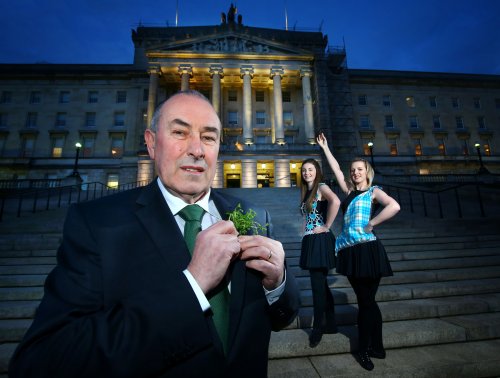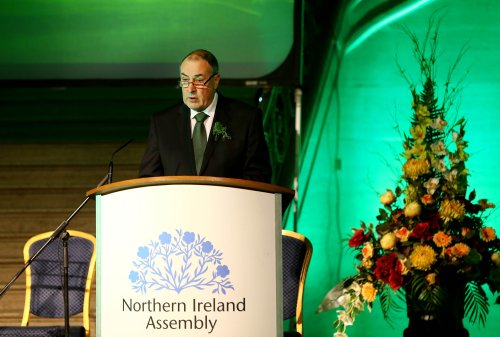Speaker to use his Time in Office to Highlight the Issue of Respect
Session: 2014/2015
Date: 18 March 2015
Reference: SO 09/14/15
The Speaker of the Northern Ireland Assembly, Mitchel McLaughlin MLA, tonight hosted the Speaker’s annual St Patrick’s event in Parliament Buildings.
The Speaker used the event to make a wide ranging speech setting out his approach to his period of office and his intention to be guided by the theme of “respect”. In his speech, the Speaker said:
“I am delighted to welcome such a diverse audience to my first Speaker’s event to mark St Patrick’s Day. Nine weeks ago today, I had the honour of being elected Speaker of this Assembly. In that time, I have quickly become familiar with some of the challenges of the job but I have also had the chance to engage with a huge range of people from right across the community at a series of events. Those events have given me the opportunity to talk about a range of issues including the need for Assembly reform and ensuring the Assembly better reflects women and young people. However, I want to use tonight to spend some time to set out my general approach to the role.
“When I am presiding over debates in the Chamber it is my role to ensure that Members are able to express their views and are able to be heard. Often, it is a question of balance. No matter how much they disagree with an opposing view, Members can respond but they cannot make it impossible for someone to give their opinion. Those who shout loudest can often have the least to say and are not the only ones who should be heard.
“Conversely, Members cannot abuse the Chamber by making overtly provocative remarks which could not pass without reaction. In extreme cases, I have to judge between those deliberately causing offence and those deliberately seeking to be offended. Often you will hear me or the Deputy Speakers call for courtesy, good temper and moderation but I can sum it up in one word – respect.
“Just as my role extends outside the Chamber, the value of respect resonates right across our society. I would like to use my time in office to do what I can to build upon that.
“We are a society comprised of a myriad of political views and cultural traditions. The series of negotiations since 1998 have demonstrated that we can only move forward on the basis of discussion and agreement. While that implies an acknowledgement that there are a range of different views to be listened to and accommodated, our day to day political conversation often does not promote that concept to the wider community. There are invariably different narratives to many issues. Too often our approach is to shout down the other view or to seek to degrade the other person’s beliefs to maintain our own.
“In the bigger picture we have to ask if this approach moves us forward? Does it help build confidence in this Assembly or our political institutions? Does it help develop the relationships our society needs to move on? Does it set a mature example to our community on the ground? Too often the answer is no.
“It is fitting to talk about respect at an event to mark St Patrick’s Day. Every year there is some degree of debate about the ownership of St Patrick and St Patrick’s Day celebrations. We can carry on that debate every year with the same outcome. No minds are changed and no-one is convinced of the other argument. What is the point in that? Would we not just be better accepting that we might have different versions of history? We may have different reasons for celebrating St Patrick’s Day but could we not acknowledge these and mark it together without aggravation?
“I was pleased that the Assembly Commission, which I chair, was able to come to a mature and constructive agreement around the external lighting scheme for this building. I want to elaborate on the days affected by that agreement to emphasise my concept of respect.
“Despite my ambition for a more united celebration of St Patrick, I know it means a lot to many in the community to see this building bathed in green tomorrow. That is a positive step forward in demonstrating respect.
“However, it would have been wrong to consider St Patrick’s Day in isolation. I am absolutely delighted that this building will have an orange glow on the 12th of July. Some people might be surprised at me saying that. Some might not be happy with me saying that. My approach is simple, you can’t expect anyone else to respect your culture if you don’t respect theirs. You don’t have to agree but you can respect and at least try to understand why it is important to the other person. The history and importance of Orange culture to many in our society can no more be denied than the history and importance of the Irish language to others. However, that is the direction where much of our public debate on these issues would take us.
“Parliament Buildings will also be lit up in red for Remembrance Day in November. There are few acts to which respect is more connected than remembrance. There have been some positive moves forward in recent years but we still have a distance to travel to be united in remembrance. This was emphasised to me when, as Principal Deputy Speaker, I led an Assembly delegation out to Flanders last November to join a cross parliamentary event at the First World War battle fields.
“We are approaching two centenaries next year, the Easter Rising and the Battle of the Somme. Both of these events are linked in a historical context. Thousands of young Irishmen of the Unionist and the Nationalist traditions fought together on the battlefields of Europe only to join different sides on returning home. It is bound to have some relevance for us to talk about the divisions that opened up then and continue to this day. However, it is also possible that we will travel on the easier and more familiar path, with each community marking exclusively those anniversaries that are important to them.
“I have spoken before about the nationalist amnesia surrounding the thousands of young Irishmen who went out to fight in the World War. Unionism too will struggle to acknowledge commemorations of the Easter Rising, but there will also be merit in trying to comprehend the motivations of those who fought for Irish independence.
“These centenary anniversaries are another challenge to the established traditions on this island but they also present exciting opportunities. Last week’s announcement of An Post’s intention to release an official stamp to mark the centenary of the Battle of the Somme and the Orange Order’s warm response to it was a positive signal of mutual respect.
“We can just mark these centenaries with inward facing events which will only sustain divisions, or we can reach out and make attempts to understand each other. There will have to be uncomfortable conversations but these events do present the opportunity for us all to demonstrate respect for the right to remember even if we do not agree with what is being remembered.
“The first of our package of days on which this building was lit was International Women’s Day. That is important because respect is not just about orange and green anymore. As our political situation has evolved so too has our community. Increasingly, diversity has moved well beyond the British and Irish context. This Assembly now serves a society of different genders, different races, different religions, different ages and different sexual orientations. Views will often diverge and that will be reflected in the Assembly but we can’t represent them if we don’t show respect for them.
“I know that the lighting of this building is a small issue in the context of the huge social and financial challenges facing this Assembly at the moment. Undoubtedly, “so what” was one of the reactions from the public. Another, was to instantly complain seeking to exclude some days or include others. Neither of those reactions encourage nor guide our politicians as they prepare to take other more difficult decisions. The agreement of the Assembly Commission was symbolic of respect. Even ten years ago, such an agreement would not have been possible. We are sometimes quick to take for granted the difficult legacy we face and not always generous in recognising progress.
“The reality we are in is that we have a society of diverse views and cultures in a constitutional arrangement which will not change unless a majority votes otherwise.
“If you accept and respect that, then what aspiration will be achieved by attempting to promote and strengthen individual cultures by seeking to diminish and degrade others? That surely can only create a political dynamic of disrespect and all the negative consequences that will engender.
“Again let me use this Parliament Buildings as an example. This building contains art and symbolism which does not reflect the cultural identities of all of our Members or communities. However, I will be the first to oppose its removal. This building was shaped by the context in which it was built and that is deeply cherished by much of our community. We cannot ignore our history. It would be disrespectful to try to airbrush that history away. However, do we need to add to and re-balance the symbolism this building?
“Well yes we do, and in upholding respect towards the history of this building, we also need to uphold it towards those who have a different view.
“Stormont should better reflect the journey we have made since 1998 and the society this Assembly now represents, inclusive of all political opinion, all faiths and none, men and women, the whole community. Adding to what we have already achieved can be addressed in a consensual way without provoking controversy, by focusing on positive outcomes, by democratic persuasion rather than confrontation. Achieving a balance in this society, which demonstrates a respect to all without being deliberately provocative should be of no threat to anyone. Achieving that balance in a way which upholds respect to all and avoids conscious disrespect to anyone is an important goal.
“Now I know I have to be realistic about the scale of the challenge. Demonstrations of disrespect such as public rows and ill-tempered attacks certainly receive more media attention and thereby serve to portray a message. I have no doubt that many politicians believe that such outbursts actually attract more votes. However, they overlook the many low level agreements which occur between parties and Members everyday around the business of this Assembly.
“It cannot be denied that the political mood music at any given time affects the environment in which any of us would feel empowered to make gestures of respect, particularly ground breaking ones.
“I am also well aware that some will not be receptive to words about respect coming from me. There are few of us in this society who will be judged to be blameless. There are plenty of fingers which can be pointed across all sides of the Chamber. Again, we should have learnt that relying on what we have always done or staying within our own comfort zone, rarely takes us forward. In this society, if we go looking for reasons not to do things we will never have difficulty finding them. However, there is always value in trying to do something different even when there is risk.
“Too often we hear the word respect used to advance a cause in one context but not to see that it equally applies when we are opposing something else. Inconsistency is one of our consistencies. I have no doubt that in time; some will come to challenge my application of it.
“I hope my decision to act as President of the Assembly Branch of the Commonwealth Parliamentary Association lays down a signal of what I am prepared to do but I am clear that respect is a concept which applies to all. No one can have a monopoly on it.
“It is precisely because I am in a role now which is outside of party politics that I would like to try and set an example. I would like to use the independence and impartiality of the Office of Speaker to set down a marker for respect. Often that impartiality and independence will mean rising above issues and staying out of party politics. However, at other times it might mean prodding and challenging all parts of the Chamber to attempt to arrive in a more positive place.
“We are in a society in which huge hurt and sensitivity is always near the surface. I know that for many showing respect to ‘others’ can trigger that hurt. However, not showing respect and exacerbating divisions won’t heal the hurt.
“There are no easy answers to the conflict and history we are emerging from. We are still some time away from reconciling our differences, it may be too much to hope in this generation that we will, but if we could accept with respect our differences, it would improve our politics and more importantly relationships on the ground.”






